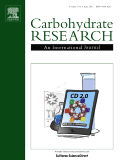
Carbohydrate Research
Scope & Guideline
Navigating the future of carbohydrate science.
Introduction
Aims and Scopes
- Carbohydrate Chemistry:
The journal showcases research on the synthesis and characterization of various carbohydrate structures, including glycosides, oligosaccharides, and polysaccharides, employing diverse synthetic methodologies. - Biological and Biomedical Applications:
Research articles often highlight the role of carbohydrates in biological systems, including their use in drug delivery, vaccine development, and as therapeutic agents against diseases. - Analytical Techniques in Glycoscience:
The journal includes studies employing advanced analytical methods such as NMR spectroscopy, mass spectrometry, and chromatography to elucidate carbohydrate structures and interactions. - Natural Products and Their Derivatives:
A significant focus is on natural polysaccharides and glycosides, their bioactivity, extraction, and potential applications in pharmaceuticals and nutraceuticals. - Environmental and Industrial Applications:
Research addressing the use of carbohydrates in sustainable technologies, such as bioplastics and biocomposites, is also a core area of interest.
Trending and Emerging
- Nanotechnology in Carbohydrate Applications:
There is a growing trend towards the use of nanotechnology in the development of carbohydrate-based materials and drug delivery systems, highlighting their potential in biomedical applications. - Glycomics and Glycoproteomics:
The field is increasingly focusing on the comprehensive analysis of glycan structures and their roles in biological processes, with implications for disease diagnosis and therapeutic strategies. - Sustainable and Green Chemistry Approaches:
Research is increasingly emphasizing environmentally friendly synthesis and applications of carbohydrates, aligning with global sustainability goals. - Carbohydrates in Immunotherapy:
Emerging research on the role of carbohydrates in immunotherapy, particularly in cancer treatment and vaccine development, is gaining traction and showing potential impact. - Interdisciplinary Research Combining Glycoscience with Other Fields:
There is an increasing trend towards interdisciplinary studies that combine carbohydrate chemistry with fields such as materials science, pharmacology, and food science.
Declining or Waning
- Traditional Methods of Carbohydrate Synthesis:
There has been a noticeable decrease in studies focusing on conventional synthesis methods, as newer, more efficient techniques (e.g., click chemistry, enzymatic methods) gain popularity. - Basic Research on Structural Polysaccharides:
While structural studies remain important, there is a waning focus on purely descriptive studies of polysaccharides without application or functional analysis. - Static Analytical Methods:
With the advancement of technology, static methods of analysis are being overshadowed by dynamic and more detailed approaches, leading to fewer publications in this area.
Similar Journals

ChemistryMethods
Fostering Collaboration and Innovation in ChemistryChemistry Methods, published by WILEY, is an esteemed journal in the field of chemical sciences that serves as a vital platform for disseminating cutting-edge research and methodologies across various domains of chemistry. With a focus on practical approaches in areas such as fluid flow and transfer processes, spectroscopy, electrochemistry, and catalysis, this journal has achieved impressive ranks in Scopus—including a notable 15th position in both fluid flow and spectroscopy categories, which reflects its significant contribution to advancing the discipline. Although Chemistry Methods operates under a traditional access model, it remains crucial for researchers, professionals, and students who are eager to engage with high-quality original research and reviews. Since its inception in 2021, the journal's objective has been to bridge the gap between theoretical knowledge and practical application in chemistry, fostering innovation and collaboration within the global scientific community.
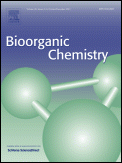
BIOORGANIC CHEMISTRY
Unveiling the synergy between chemistry and biology.BIOORGANIC CHEMISTRY, published by Academic Press Inc., a prestigious imprint of Elsevier Science, represents a cornerstone in the fields of biochemistry, organic chemistry, and drug discovery. With an impressive Scopus rank placing it in the top quartiles across critical categories—including Q2 for Biochemistry and Drug Discovery, and Q1 for Organic Chemistry—this journal has established itself as a vital resource for researchers, professionals, and students alike. Featuring a diverse array of articles that explore innovative methodologies and emerging trends from 1971 to the present, BIOORGANIC CHEMISTRY effectively bridges the gap between laboratory research and practical applications. Although not an Open Access journal, its rigorous peer-review process ensures the delivery of high-quality, impactful research that drives advances in the understanding and application of biochemistry. With an aim to facilitate scientific discourse and collaboration, it invites contributions that further the exploration of chemical processes within biological systems.
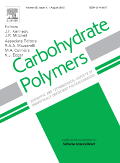
Carbohydrate Polymers
Elevating the standards of materials chemistry.Carbohydrate Polymers is a prestigious academic journal, published by ELSEVIER SCI LTD, that plays a vital role in the field of materials chemistry, organic chemistry, and polymer science. With its Q1 category rankings in these domains, this journal serves as a critical platform for disseminating high-quality research, innovative methodologies, and significant advancements in carbohydrate-based polymers. Since its inception in 1981 and continuing until 2025, it has fostered critical discussions and collaborations among researchers, professionals, and students worldwide. Although it does not offer open access, its rigorous peer-review process ensures that only the most impactful studies are published. By highlighting new developments in the synthesis, characterization, and application of carbohydrate polymers, Carbohydrate Polymers consistently contributes to the enhancement of knowledge and technology within its field, making it an essential resource for anyone working at the intersection of chemistry and materials science.
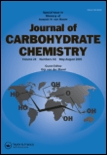
JOURNAL OF CARBOHYDRATE CHEMISTRY
Unlocking the Potential of Carbohydrates.JOURNAL OF CARBOHYDRATE CHEMISTRY is an esteemed academic journal published by TAYLOR & FRANCIS INC, specializing in the intricate field of carbohydrate chemistry. With a focused scope that encompasses the chemical properties, synthesis, and applications of carbohydrates in various biological and industrial contexts, this journal serves as a vital resource for researchers, professionals, and students alike. Although currently not open access, it provides essential insights into both fundamental and applied aspects of carbohydrate research. Since its inception in 1982, the journal has made significant contributions to the scientific community, maintaining relevance through its continuous publication cycle projected to run until 2024. As reflected in its Scopus rankings, it occupies a niche position within the Q4 quartile in Biochemistry and Q3 in Organic Chemistry, making it a crucial platform for disseminating cutting-edge research findings in these fields. The journal's objective is to foster discussions that advance the understanding of carbohydrate functionality, thereby enhancing innovation and application in diverse scientific domains.

Molbank
Advancing Molecular Insights for a Collaborative FutureMolbank is an open-access journal published by MDPI, dedicated to the fields of Biochemistry, Organic Chemistry, and Physical and Theoretical Chemistry. Established in 2002, this journal has served as a vital platform for the dissemination of research findings, where researchers and professionals share original articles focusing on molecular chemistry, synthesis, and related studies. With a commitment to open access, Molbank enables global access to scientific knowledge, fostering collaboration and innovation among scientists. While currently categorized in the fourth quartile for its field rankings, it provides a unique opportunity for emerging scholars to contribute to and engage with the scientific community. The journal is based in Switzerland, operating from its office at ST ALBAN-ANLAGE 66, CH-4052 BASEL, SWITZERLAND, and continues to attract submissions until 2024. Researchers, students, and professionals looking to expand their knowledge and participate in the dialogue of current molecular chemistry can benefit significantly from engaging with the content published in Molbank.
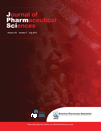
JOURNAL OF PHARMACEUTICAL SCIENCES
Pioneering insights in pharmaceutical sciences since 1961.The JOURNAL OF PHARMACEUTICAL SCIENCES, published by ELSEVIER SCIENCE INC, stands as a cornerstone in the field of pharmaceutical sciences, offering a platform for innovative research and advancements since its inception in 1961. With an impressive Scopus Rank of #36 out of 183 in the Pharmaceutical Science category, this journal is recognized for its commitment to disseminating high-quality, peer-reviewed studies that significantly contribute to the realms of pharmacology, toxicology, and pharmaceutics. Holding a 2023 Q2 category quartile, it attracts a diverse readership encompassing researchers, industry professionals, and students eager to advance their understanding and expertise. While the journal is not open access, it ensures valuable insights in every issue, making it an essential resource for those dedicated to the evolving landscape of pharmaceutical research. With an impact factor that reflects its relevance and influence, the JOURNAL OF PHARMACEUTICAL SCIENCES continues to shape the discourse in its domain, fostering innovation and collaboration among scholars worldwide.
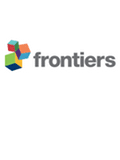
Frontiers in Chemistry
Empowering Global Collaboration in Chemical Research.Frontiers in Chemistry is an esteemed and innovative Open Access journal published by FRONTIERS MEDIA SA, based in Lausanne, Switzerland. Since its inception in 2013, the journal has established itself as a leading platform for the dissemination of high-quality research across a broad spectrum of chemistry disciplines, achieving a notable Q1 classification in the miscellaneous chemistry category as of 2023. With an impressive Scopus rank, placing it at 72nd out of 408 in General Chemistry and falling within the 82nd percentile, Frontiers in Chemistry is committed to publishing significant findings that contribute to the advancement of the field. The journal's Open Access model ensures that research is freely accessible to all, fostering a greater exchange of knowledge and collaboration among researchers, professionals, and students globally. It covers a range of topics, from organic and inorganic chemistry to materials science and biochemistry, making it an essential resource for anyone seeking to stay at the forefront of chemical research.
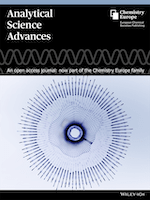
Analytical Science Advances
Catalyzing Progress in Analytical Chemistry ResearchAnalytical Science Advances is a dynamic journal published by WILEY, dedicated to the ever-evolving field of analytical chemistry. With an ISSN of 2628-5452, this open-access platform aims to disseminate high-quality research and insightful reviews that push the boundaries of analytical methodologies and instrumentation. Since its inception in 2020, the journal has gained traction, securing a commendable Q2 ranking in 2023 within its category, highlighting its significance in the scientific community. Currently positioned at Rank #68 out of 156 in Scopus' analytical chemistry category, it boasts a 56th percentile ranking, reflecting its contributions to advancing analytical techniques. Researchers, professionals, and students will find this journal an invaluable resource for keeping abreast of the latest developments, emerging technologies, and innovative approaches in analytical science, ensuring the journal's relevancy and influence in shaping future discoveries.
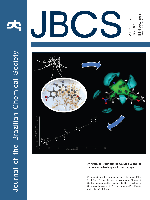
JOURNAL OF THE BRAZILIAN CHEMICAL SOCIETY
Catalyzing Knowledge: Transforming Chemistry Through Open DialogueThe Journal of the Brazilian Chemical Society (ISSN: 0103-5053; E-ISSN: 1678-4790), published by the Sociedade Brasileira de Química, stands as a prominent outlet for disseminating high-quality research in the field of chemistry. Since its establishment as an Open Access journal in 1990, it has been committed to providing unrestricted access to innovative findings and discussions that propel the advancement of chemical sciences globally. Located in the vibrant research landscape of Brazil, this journal aims to showcase a wide range of topics including analytical, organic, inorganic, and physical chemistry, among others, catering to a diverse audience of researchers, professionals, and students alike. The journal holds a noteworthy distinction with a Q3 quartile ranking in the field of miscellaneous chemistry for 2023 and is indexed in Scopus, reflecting its growing influence in the academic community. With a publication cycle that spans continuously from 1990 through 2024, it serves as a vital resource for anyone seeking to stay informed about the latest trends and breakthroughs in chemistry.

Analytical Science and Technology
Elevating the standards of analytical chemistry and technology.Analytical Science and Technology is a prominent journal dedicated to advancing the fields of analytical chemistry and technology, published by the Korean Society for Analytical Science. Based in South Korea, this journal serves as a vital platform for researchers, professionals, and students committed to exploring innovative analytical techniques and methodologies. Although it is classified under Q4 in various subject categories, including Agronomy and Crop Science, Environmental Chemistry, and Pharmacology, the journal aims to provide critical insights and contributions to the scientific community. With ISSN 1225-0163 and E-ISSN 2288-8985, it spans a converged timeline from 2019 to 2024. Despite its current standings in Scopus rankings, the journal is dedicated to improving its visibility and impact through rigorous peer review and high-quality publications, fostering knowledge sharing within its diverse academic fields. Researchers looking for a reliable outlet for their findings are encouraged to consider this journal as it continues to strive for excellence in analytical science.